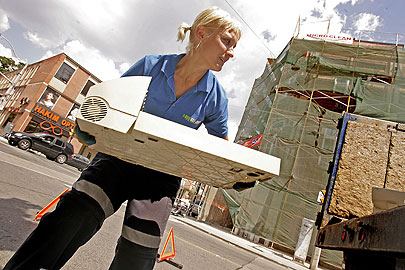|
|
|||||||||||||||||||||||||||||||
|
Lose Weight while Working
Working the Fat Away:
August 28th 2007. Forget the gym – your best workout may be your summer job. Samantha Lavenuik, 26, has a washboard stomach, biceps to die for and a 28-inch waist thanks to the gruelling work of tossing people's trash for eight hours a day for 1-800-Got-Junk? The only female in the company's Toronto office, the 5-foot, 10-inch Lavenuik has seen her weight drop from 160 pounds to 129 since she started the job in April. "I've got muscles I didn't even know I had," jokes Lavenuik, whose previous job was running a video store. "I've gone from an XXL shirt to a small and the small is even too big for me. Everyone's amazed. I can lift the couch up by myself, no problem. I have abs." Running up and down stairs carrying heavy boxes, tossing debris into a truck, smashing a cast-iron bathtub with a hammer and removing it in chunks have all contributed to her total body make-over. Hard physical labour has accomplished what five visits to a gym each week could not, marvels Lavenuik, who dropped her membership two months into the job. She plans to enter a paramedic program at Seneca College next fall and says she deliberately picked a physical summer job to help prepare for her future career. In the meantime, she's happy with the work. "Sadly, I really enjoy moving people's garbage." Lavenuik is among Ontario's 500,000 college and university students who each summer scramble for jobs that will help pay tuition and rent for the next school term. Some are lucky enough to land work that gives them experience in professions they're pursuing. Others luck into jobs that help them get in shape. Health-conscious Jessie Barrett, 19, who is majoring in sports management at Brock University in St. Catharines where she plays varsity soccer, purposely sought a physically challenging job for the summer. Other jobs she'd had in a grocery store and as a sales clerk in retail did not keep her active enough, she felt. Working in Cudmore's Garden Centre near her home in Oakville, Barrett hauls bags of dirt, carries large plants and shifts display cases. She's getting buff. "I notice a big difference in my arms; they're toned now. I've never been able to see my muscles before," says the 5-foot-1 Barrett, who has dropped from a size 4 to a size 2. "I feel I look a lot better in a bathing suit," says Barrett, adding that she also has a serious farmer's tan. "I feel good. I'm tired at the end of the day. I sleep a lot better. It's all about healthy and active living." Lifeguard Ramata Tar Wally, 18, is also no longer carrying around that "freshmen 15" she picked up during her first year in residence at the University of Guelph. The effects of too many nacho chips just melted away under hours of lap swimming each day while leading swimming lessons for the City of Toronto. On top of that, she swims one kilometre three or four times a week as part of a personal fitness program.
"I find it a lot easier to ride my bike to work. I'm not out of breath," says Tar Wally, who lifeguards and instructs at the Rotary Park outdoor pool in south Etobicoke. Working at a swimming pool has improved more than her cardio functions, she says. "I think it has made me a better driver. Here, we do a lot of scanning – I'm more aware of things happening around me." And working outdoors, adds Tar Wally, means she has also enjoyed the mentally uplifting effects of being in the sun. Brandon Zoras' summer job as Scarborough camp co-ordinator, in charge of seven different camps for the City of Toronto, is literally a breath of fresh air. Majoring in biochemistry and psychology at the University of Toronto, Zoras, 22, says, "I've read text books for so long that when I look up my vision is blurry. When I do lab reports, it can mean a whole night of work." His summer work, meanwhile, is completely different. "A lot of the time we are playing games. You have to have the same amount of energy as the kids. If they are running, we'll all participate." The 5-foot-7 Zoras topped 185 pounds in winter and says his pants were getting tight. Now, after running all day to keep up with active campers, he's melted away about 15 pounds. "I feel good," he says, "even the days when I'm tired." Organizing camp activities has been a fitness program for Charity Fowler, of Pickering. The 21-year-old history major at UofT runs the West Rouge Imagination Camp. "I'm pretty active; I play the games with the kids." It's important for counsellors to participate, she says, so that older campers who may feel they are "too cool for school" will jump in when they see their role models having fun. So summer is her time to get back in shape, says Fowler, who also works evenings and weekends at a garden centre where she lifts garden furniture and brings supplies out of a warehouse. Although she's working a lot of hours, Fowler says her summer couldn't be better. "I am much happier working outdoors than inside. I love the fresh air. I get to see the sun. I feel great."
Lose ten pounds in two weeks by changing how you workThe last time I wrote about losing weight was right after I had a baby and my agent told me that I would kill my career if I went on speaking engagements. “You look terrible” is what she told me. And I lost forty pounds in two months. This time, things were not so dramatic. If nothing else, I am tall enough that no one would notice ten pounds up or down on my body. But still, ten pounds is ten pounds. And I lost it by changing how I do my job. Here are three changes I made in how I work that, in turn, changed how much I weigh: 1. I stopped letting work slip until the last minute. I know people think they are creative under pressure. But in fact, time pressure stifles creativity. One of the joys of being creative is going up paths that surprise us. But when you are under a tight deadline, the risk of going down an unsure path is too risky because it might not work and then you’ll miss the deadline. I became acutely aware of this when I started blogging. The immediate feedback one gets from blog traffic made me understand that there was a direct relationship to how much pressure I felt while I was writing and how successful the post was. I also noticed that when I felt pressure to write quickly I ate to cope with the pressure. Once I stopped writing late at night under intense pressure I ate much less at night. 2. I stopped checking email when I was with my kids. For the most part, I maintain a schedule where I work seven days a week 8am to 2pm. Then I am with my kids from 2pm to 8pm. And I usually work after they go to bed. Almost everyone is very nice about respecting the schedule. But still, I was checking email all day. Sometimes because I really needed to, but mostly it was a way to take a break from being with the kids. The kids are hard. Email is easy. Please, don’t send me emails about how I should take the kids to the park. I’m not saying I don’t love my kids. I’m saying that it’s more fun to play email lottery to see if something great came in than to watch kids chasing each other up and down slides. The worst part about checking email when I am with the kids is that I feel bad ignoring them. But the second worst part is that I sort of check out when I check email and once I check out then my junk-food guard is down, and I find myself watching kids and checking email and eating Cheetos all at the same time. I instituted the no-checking email so that I could be more present with my kids. But the lucky side benefit was no more junk food. 3. I stopped working late at night. The first lunch meeting I had with my first publisher was all about book marketing. We talked about how sometimes my editor thinks of a title and then asks an agent to put together a book based on that title. “Like what?” I asked. She said, “Like, Sleep Away the Pounds! How To Lose That Last Ten Pounds…. In Your Sleep” “Ooooh,” I said “That is a good title.” For the rest of the lunch the editor and the publicist and I all talked about that book. What it could be. The publicist pointed out that he stays up late working but he never really gets anything done except eating. He thought he should just go to bed. I thought that was probably true for me, too. And I pointed out all the research that says the people who do not get enough sleep are at risk of being fat. That conversation happened a year ago. And, ironically, I then proceeded to get less sleep than any year of my life because I stayed up all night doing stuff to promote my book. But recently I decided to make a rule for myself that I have to get the recommended six or seven hours of sleep a night. This means I had to get used to not working as much. I had to decide to simply not do some of the work I had. But the life benefits have beenworth it — including giving up that extra meal that slips in between dinner and bed. So that’s how I lost the weight. And it’s been very easy to keep off because I did exactly what you’re supposed to do to lose weight: I changed how I live my life rather than how I eat my meals. But here’s what really gets me excited: I learned so much about self-discipline. There is great research about how if you add self-discipline to your life in one area, self-discipline seeps into other areas of your life as well. This is important because positive psychologists are always saying that self-discipline is a key factor to making ourselves happier. So I always want more self-discipline in my life. And I absolutely found that when I became more disciplined about how I deal with my sleep and eating, I became more disciplined about working out. For the last year I have had clear goals for regular episodes of running, weights and yoga. But I have generally failed at achieving these goals on a regular basis. Something always interferes. But over the past two weeks, when I have been very conscious of changing how I conduct myself during the day for work things, my exercise regimen has improved as well, as a sort of unintended side-effect. So here’s my pitch to you to try something new. Try being just a little more conscious. If you become more conscious in one part of your life, you will be able to affect positive, conscious change in many parts of your life with relative ease.
New workout programs focus on building muscleAmy Jones used to think of a strenuous workout as a long run on the treadmill. Then she joined her husband at CrossFit, a gym he belongs to that stresses Olympic-style weightlifting and other strength moves over cardio. Within a few sessions, she was hooked. "I'm more toned, I have more energy and more endurance," she said. "I've turned fat into muscle, and my clothes fit better." She has no intention of returning to the treadmill. Almost 40 years after Dr. Kenneth Cooper coined the term "aerobics," a concept that would later spawn a generation of spandex-clad cardio junkies, some trainers are steering their clients away from traditional cardio-intensive workouts and toward mostly strength moves. The reasons: Many exercises that are good for the heart are hard on the joints. And cardio training without muscle conditioning leads to loss of muscle and bone density as well as fat, experts say. Even Cooper now believes strength training is important. Some people — those fighting aging and those with injuries — benefit from more time on muscle conditioning than cardiovascular exercise, he said in an interview from his Texas clinic. He cites Hall of Fame quarterback Troy Aikman, a one-time cardio king who shifted to more intense weight training. (Aikman said through a spokesman he does not think cardio is overrated, but he cut way back on his once daily 4-mile runs because he didn't want to further tax his body. He dropped body fat when he made the change, he said.) Cooper does not believe cardio is a bad habit to be kicked. "If you go strictly muscular-skeletal conditioning, it's a major mistake," he said. "You'll wear out." Exercise equals strength training for author Cooper's belief is not shared by Jim Karas, author of "The Cardio-Free Diet." Karas believes cardio workouts overstress the body and work against those trying to lose weight. Karas, who helped Diane Sawyer get svelte, experienced a revelation in the '80s when he was an aerobics instructor. He saw shocking amounts of excess flesh, even on those who came to class religiously. Then he looked in the sparsely populated weight room. "Everyone was so lean!" he said in an interview from his Chicago studio. Karas changed his approach and found he and his clients could keep weight off more easily with strength training rather than aerobics. The book jacket of "The Cardio-Free Diet" promises "real results" with just 60 minutes of exercise a week. But Karas said he works out 40 minutes, five days a week. The added time in the gym is to relieve stress, he said. Karas walks most everywhere — a form of cardiovascular exercise, he acknowledged, adding that he encourages clients to take stairs instead of elevators and park farther away to build activity into daily life. For those who love cardio workouts, Karas recommends no more than 30 minutes at a time, because of potential joint damage and his belief that cardio stimulates the appetite. He favors "compound exercises" that combine upper and lower body moves and get the heart pumping. "My whole goal is I just want people to stop pounding their bodies," he said. "When people hear 'exercise,' I want them to think of strength training." Breaking the cardio habit In Atlanta, many trainers share some of Karas' views, but they still encourage their clients to incorporate cardio into their workouts. Matt Parrott, an assistant professor of health and fitness management at Clayton State College & University, said he directs his clients toward a workout they will enjoy and that will help them reach their goal. For clients looking to lose weight, he encourages them work on their diet rather than expect miracles from a cardio workout. "It's far easier not to ingest 300 calories than it is to ingest it and then burn it off," he said. While working in Kansas City last year, Parrott advised a client to shift his regime from mostly cardio to mostly strength training. Patrick Madden, a former marathon runner, said he dropped body fat and lost 12 pounds in a month when he changed from intensive running and cycling to weight work. "I had been really focusing on cardio, and Matt said, 'I want you to stay off the treadmill,' " Madden recalled. "It was a hard habit to break." Now Madden takes a weekly spinning class and occasionally uses the elliptical, but he is more at home in the weight room. He seeks advice from Parrott via e-mail and said he will never go back to running and cycling to stay fit. 'Where's the cardio?' At the CrossFit Atlanta gym in Midtown, there are no elliptical trainers, treadmills or stationary bikes. But people are sweating, and not just because there's no air conditioning. The CrossFit approach is known as one of the most grueling workouts around, a combination of moves based on gymnastics and weightlifting. The program, founded by a gymnast more than 20 years ago, counts among its recruits men and women in the military, firefighters, cops, basketball players and runners who have reached plateaus. But newcomers are often jarred by what they don't see. "People come in all the time and say, 'Where's the cardio?' " says Dan MacDougald, a CrossFit Atlanta trainer. "Our workouts are constantly varied ... we generally lean toward hard and fast." A beginner CrossFit workout involves push-ups, jumping pull-ups and squats, done in quick succession, creating a winded effect similar to running on a treadmill. But the focus is on improving overall fitness through proper form rather than mindless, sweat-inducing workouts on a cardio machine. Amy Panos remains unconvinced. The Buckhead newlywed recently shed 25 pounds with help from Buckhead private trainer Paul Rodgers. She credits a combination of strength training, an organic diet and "a lot of cardio" for her success. And she didn't resist when Rodgers ordered her back on the treadmill for another half-hour of cardio after an hour-long workout. "He's a proponent of cardio," she said. "And I am too for sure." STRENGTH AND CARDIO: FINDING THE BALANCE Cardio and strength training each has its place in a fit lifestyle. Even Jim Karas, author of "The Cardio-Free Diet," is an avid walker. Experts disagree on just how much of each a person needs. "There's an unfortunate trend to emphasize one over the other," says J. Andrew Doyle, an associate professor of kinesiology and health at Georgia State University, adding that flexibility is a third component of balanced workout. Here's what Dr. Kenneth Cooper, the Texas doctor who coined the term "aerobics" in the late 1960s, advises his patients:
Cooper, 76, suggests shifting to even more strength work as you age. His advice is based on his experience. As he aged, he had endurance but he lacked strength. He started lifting weights. Some younger athletes need to shift away from cardio because of injuries, he said. "If your body starts breaking down, listen to it." CUTTING BACK THE CARDIO MIGHT BE FOR YOU IF:
|
|
||||||||||||||||||||||||||||||
|
Website Design + SEO by designSEO.ca ~ Owned + Edited by Suzanne MacNevin | |||||||||||||||||||||||||||||||



